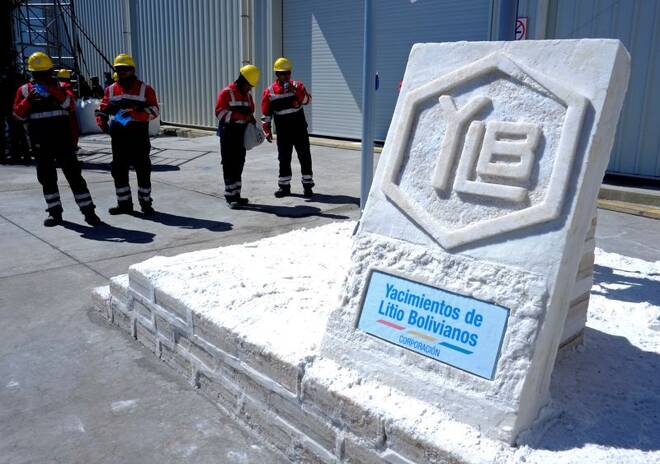Advertisement
Advertisement
In Bolivia’s heartland, protests rattle lithium development push
By:
By Daniel Ramos and Monica Machicao LA PAZ (Reuters) - Protesters in Bolivia's lithium-rich region of Potosi are blockading a key processing plant, demanding legislation that guarantees better benefits for local communities and larger royalties from extraction of the electric battery metal.
By Daniel Ramos and Monica Machicao
LA PAZ (Reuters) – Protesters in Bolivia’s lithium-rich region of Potosi are blockading a key processing plant, demanding legislation that guarantees better benefits for local communities and larger royalties from extraction of the electric battery metal.
The protests are focused on a plant in Llipi, near the Uyuni salt flats, which hold one of the world’s largest troves of the metal whose price has surged so much during the global shift towards electric vehicles that it is now called “white gold”.
Led by the Civic Committee of Potosi (Comcipo), the protesters have threatened the government with an indefinite strike if Potosí does not receive more public works projects and royalties for lithium.
“Unfortunately there are authorities that have tried to generate a kind of division,” Yamile Cruz, a local protest leader, said in a recorded statement. She said local organizations “want the development of our department of Potosí, and of our region, because as a region we have given our resources in the past and we are going to continue giving our lithium.”
Potosi, which centuries ago hosted huge silver mines, has long butted heads with the central government over who should benefit from its riches. That is one reason Bolivia has long struggled to develop lithium commercially.
The stand-off could threaten the government’s revived push to advance lithium projects and make batteries, including through a recent deal with a Chinese consortium led by the world’s largest battery maker CATL.
Local authorities pledged to try to ease the tensions.
“We are going to redouble our efforts as authorities … so that this mobilization is lifted,” said Jhonny Mamani, Potosi governor.
Officials blamed the protests on misinformation campaigns and urged Bolivians to allow projects to move ahead or risk losing the chance to develop lithium resources.
“We have a twenty-year window of time to take advantage of this resource and industrialize it in the country,” Carlos Ramos, head of state lithium company Yacimientos de Litio Bolivianos (YLB) told local media.
“The window of time is definite. We have to exploit it now.”
(Reporting by Daniel Ramos and Monica Machicao; Writing by Anna-Catherine Brigida; Editing by David Gregorio)
About the Author
Reuterscontributor
Reuters, the news and media division of Thomson Reuters, is the world’s largest international multimedia news provider reaching more than one billion people every day. Reuters provides trusted business, financial, national, and international news to professionals via Thomson Reuters desktops, the world's media organizations, and directly to consumers at Reuters.com and via Reuters TV. Learn more about Thomson Reuters products:
Advertisement
